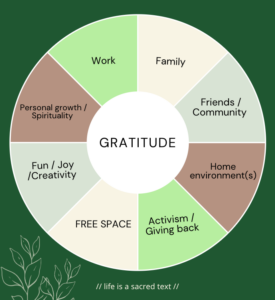Dear Congregation Beth Israel members and friends,
A few days ago, I told my son that I was trying to figure out what to write about in my January newsletter column. Now that we’re done with Chanukah, there aren’t any Jewish holidays until next month. I know what I want to write about for February, but what is the wisdom we need now, as we begin a secular new year at a time when Jewishly life is just… going on?
Without missing a beat, he asked, “Why don’t you write about how to keep your Jewish life going when there aren’t Jewish holidays happening?” His suggestion immediately resonated with me. As beautiful as our festivals are, living Jewishly isn’t just about holiday celebrations. Living Jewishly is a way of being, an approach to everyday life that’s not just for sacred time.
Living Jewishly means “an attitude of gratitude.” Hoda’ah, gratitude, is connected with the name Yehudah, the son of Jacob from whom we take our name. In Hebrew, Jews are yehudim – literally descendants of Judah, though many sages (including the Chiddushei HaRim) highlighted the connection between yehudah and hoda’ah, making us “the grateful ones.”
Maybe that takes the form of aspiring to make the traditional 100 blessings each day that Talmud recommends. Or if that sounds like a lot, start with thanking God or the Universe for 5 things a day, and see how that feels?
 There’s a great gratitude wheel at the bottom of this recent piece by Rabbi Danya Ruttenberg. (I’m sharing her graphic here also.) She suggests picking one section of the wheel at a time, and brainstorming a list of five items in that quadrant for which one can feel grateful.
There’s a great gratitude wheel at the bottom of this recent piece by Rabbi Danya Ruttenberg. (I’m sharing her graphic here also.) She suggests picking one section of the wheel at a time, and brainstorming a list of five items in that quadrant for which one can feel grateful.
As most of you have heard me say before, it’s okay if you aren’t sure about “belief” in “God.” Studies have shown that articulating gratitude is good for us, emotionally and spiritually, even if we aren’t certain to whom the gratitude should be directed. The act of saying thank-you (and meaning it) can change how we feel about our lives. This is my most profound spiritual practice.
Living Jewishly means constant learning, turning and turning Torah to find new wisdom in it – and recognizing that in a spiritual sense everything in life is Torah, a locus of learning. My chaplaincy supervisor in rabbinical school used to talk about “the lived Torah of human experience,” reminding us that everyone’s life is a sacred story, worthy of deep exploration.
Living Jewishly means taking responsibility for our actions and choices, making teshuvah (turning our lives around) whenever we realize we’ve veered off course. Most of us probably think of the weeks leading up to the Days of Awe as our time of year for focusing on teshuvah, and that’s not wrong. But that’s not the only time of year when we can do that internal work.
Living Jewishly means embracing Jewish traditions and practices. Maybe this takes the form of joining in community to celebrate Shabbat, marking the end of each week with prayer and song and sacred rest. Or how about engaging in tikkun olam, “repairing the world” in all the little ways we can? (What kind of tikkun olam projects would you like to see our shul take on in 2025?)
Living Jewishly means being in community. Judaism is not a solitary activity or a spectator sport. In requiring a minyan for many of our prayers and practices, our tradition teaches us that we are more together than the sum of our parts. Living Jewishly means being there for each other even when we are different. I can’t think of any deeper wisdom to meet this moment.
I look forward to living Jewishly with every one of you over the course of 2025! And though the secular new year has now begun, Judaism actually offers us four opportunities to celebrate a new year, one for each season. So if you’re already missing that New Year feeling, never fear – there’s always another Jewish New Year on the spiritual horizon.
There’s the big one, of course – in the fall we celebrate Rosh Hashanah. In summer there’s the New Year of the Animals on the 1st of Elul (usually sometime in August). In spring there’s a new year on the 1st of Nissan, the month containing Passover (usually landing in March or April on the secular calendar). And in winter there’s Tu BiShvat, the New Year of the Trees.
This year at Tu BiShvat, our community choir and musicians will offer a feast of seasonal music. Curated by our Music Director Adam Green, the music selections span a wide range of genres and styles, taking us on a journey through the four seasons and the emotional states they might evoke. Please save the date (2pm on Sunday, February 9) and plan to join us.
Here’s to 2025! I’ll take all the new beginnings I can get.
Blessings to all,
— Rabbi Rachel





